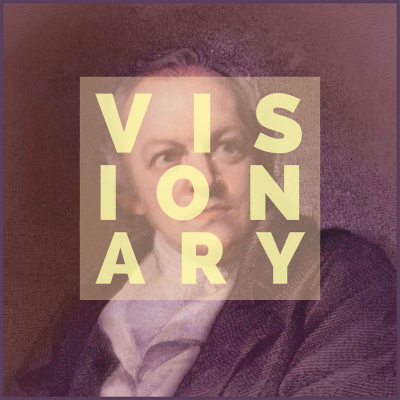
Visionary: How William Blake Changed the World
English
Technology & science
Limited Offer
1 month for 9 kr.
Then 99 kr. / monthCancel anytime.
- 20 hours of audiobooks / month
- Podcasts only on Podimo
- All free podcasts
About Visionary: How William Blake Changed the World
A series of podcasts on the life, work, and reception of William Blake, exploring his impact on literature, the visual arts, music and more.
All episodes
28 episodesImagination and the pregnant mind in William Blake's cosmogony
In his early prophetic works, William Blake presents his own creation myth, which reinterprets Genesis and critically examines contemporary medical discourse on generation and birth.In this talk Annalise Volpone explores a specific trope that emerges from Blake's depiction of imagination and (artistic) creation: partus mentis, the parturition of the mind. Annalisa Volpone is an Associate Professor of English Literature at the University of Perugia. She specializes on modernism and romanticism; her research includes the intersections between literature and medicine in the Romantic period. She is currently working on a monograph on birth metaphors and imagination in William Blake.
A Guide to William Blake's The Four Zoas
Begun some time around 1797, Vala or The Four Zoas is William Blake's great unfinished masterpiece, an attempt to provide a complete mythology of Blake's universe of characters, Urizen, Los, Orc, Vala and many more. The poem has fascinated and perplexed readers ever since and, in this episode of Visionary, Professor Jason Whittaker is joined by Dr Annise Rogers who has worked in detail on Blake's epic. They discuss the conditions in which the poem was written, as well as provide some explanation as to its characters and significance.
Mirror Writing and Designing in William Blake's Illuminated Books
In 1789, Blake developed the relief etching technique which he described as "a method of Printing which combines the Painter and the Poet," allowing him to simultaneously write and design on copper plates for his illuminated books. This process required Blake to write and design in reverse, leading him to develop his command of retrography. Consequently, what appears "forwards" on the printed page is the product of a "backwards" preparatory process. In this talk, Dr Camille Adnot analyses the workings of these reversed words on the printed page, examining the dynamics of reading text backwards, and the function that these words serve within the illuminated book. This investigation into mirror writing and its implications extends to Blake's practice of mirror designing, which, though less obviously subversive and challenging for the reader, still operates a reversal of important proportions, providing some of the dynamics behind Blake's fearful symmetries.
William Blake and New Age Music
Blake famously begins Milton: A Poem with the call to "Rouze up, O Young Men of the New Age!" That phrase has been connected to the "New Age" movement in the 1960s and 1970s, and Blake has long been recognized as an important influence on the poets and visual artists of that time, but it could be argued however, that it was a cohort of musicians that best manifested his vision for art during this era. Jacob Smith outlines a series of resonances between Blake and the first wave of New Age musicians, which includes Iasos, Suzanne Doucet, Stephen Halpern, Steve Roach, Michael Stearns, Constance Demby, and Laraaji. Crucially, both Blake and this school of New Age musicians are legible as visionary artists. Blake has long been offered as a paradigmatic example of the visionary artist, and New Age musicians of this period are notable for the way in which they brought a similar approach to the realm of recorded music.
William Blake, Gregory Bateson and David Lynch: Audiovisual Approaches to Blake Scholarship
Jacob Smith discusses parts of his book, Bateson's Alphabet: The ABCs of Gregory Bateson's Ecology of Mind. Bateson began his academic career as an anthropologist in the 1930s, collaborated with Margaret Mead on groundbreaking anthropological research utilizing photography and motion pictures, and participated in the founding conferences on cybernetics. After parting ways with Mead, Bateson embarked upon a series of research inquiries that moved across academic disciplines, culminating in Steps to an Ecology of Mind (1972), a book that brought him a new level of public recognition and influence. Bateson was deeply influenced by the work of William Blake, and the talk will present his thoughts on Blake. This talk also explores an audio visual adaptation of Blake with reference to the soundscapes of David Lynch, which Jacob has used to create an audiovisual essay on William Blake's The Sea of Time and Space.
Choose your subscription
Limited Offer
Premium
20 hours of audiobooks
Podcasts only on Podimo
All free podcasts
Cancel anytime
1 month for 9 kr.
Then 99 kr. / month
Premium Plus
Unlimited audiobooks
Podcasts only on Podimo
All free podcasts
Cancel anytime
Start 7 days free trial
Then 129 kr. / month
1 month for 9 kr. Then 99 kr. / month. Cancel anytime.























